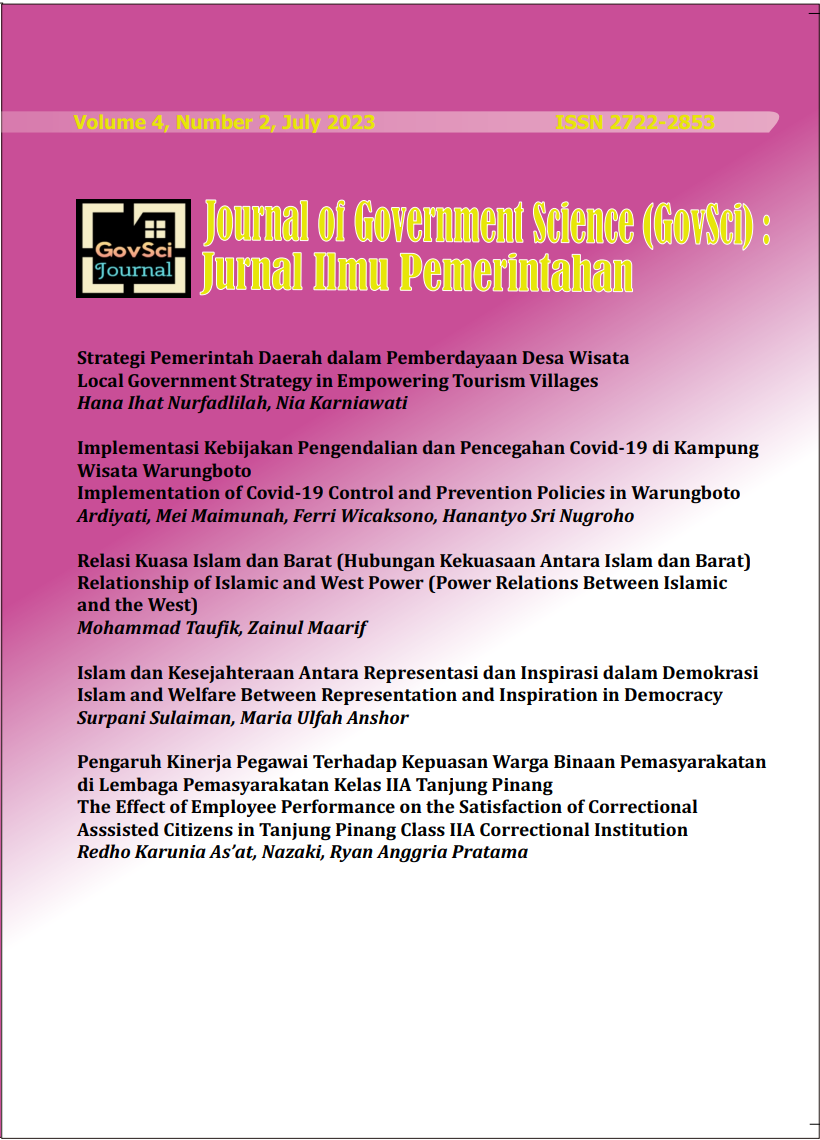Islam dan kesejahteraan antara representasi dan inspirasi dalam demokrasi Islam and welfare between representation and inspiration in democracy
Abstract
Social welfare is often measured based on aspects such as income, population, health, education, employment, consumption, housing, and social culture. However, some people who already have a luxurious house, vehicle, deposit, and various other forms of wealth actually feel anxious, restless, fearful, and even commit suicide. This fact shows that there is something lacking in measuring social welfare. Islamic economics offers a different concept of welfare. Welfare in Islam is not only measured from the material aspect, but also from the spiritual aspect. In Islam, the happiness of life is given by Allah SWT to anyone who is willing to do good deeds accompanied by faith in Allah SWT. Three indicators for measuring welfare and happiness in Islam are mental formation (tauhid), consumption, and the disappearance of fear and all forms of anxiety. Zakat is one of the important instruments in Islamic economics to achieve social welfare. Zakat is an obligation for every Muslim who is able to give out a portion of his wealth to be given to those in need. Zakat can make a significant contribution to the economy of society, especially for rural communities. Zakat can also help reduce poverty and social inequality. By applying the concept of welfare offered by Islam, we can create a prosperous society, both materially and spiritually.
References
Al-Ghazali, Abu Hamid. 1991. Al Mustashfa min Ilmi Al Ushul, Vol. 2, Madinah: Universitas Islam madinah.
Al-Mawardi, Ali bin Habib. 1982. An-Nukat Wa al-Uyun Tafsir al- Mawardi, Vol. 4, Kuwait: Wizarat al-Auqaf Wa as-Syu‘un al-Islamiyah.
Ar-Razi, Muhammad Fakhruddin. 1981. Tafsir Al-Fakhr ar-Razi asy-Syahir bi Tafisr al Kabir Wa Mafatih al Ghaib, Vol. 9. Beirut: Dar el Fikr.
Athiyyah, Muhyi al Din. 1992. Al Kasysyaf al Iqtishadi Li Ayat al Qur’an al Karim, Riyadh: Al Dar al Ilmiyah Lil Kitab al Islami.
Badan Pusat Statistik, Berita Resmi Statistik, Februari 2015. Chapra, Umer. 2001. Masa Depan Ilmu ekonomi (Sebuah Tinjauan Islam), Jakarta: Gema Insani Press. Ibnu Khaldun, Abdurrahman. 1994. Muqaddimah Ibnu Khaldun, Beirut: Muassasah Al Kutub Ats Tsaqafiyah.
Ibnu Zanjawaih, Hamid. 1986. Kitab Al Amwal, Riyadh: King Faisal Center For research and Islamic Studies.
Jones, Charles I. dan Peter J. Klenow. 2011. Beyond GDP? Welfare across countries and Time, LAEF growth and development conference, Chicago.
Hallaq, Muhammad Subhi bin Hasan. 2007. Al Idhahat Al ‘Ashriyyah Lil Maqayis Wal Makayil Wal Auzan Wan Nuqud As Syar’iyyah, San’a: Maktabah Al Jil Al Jadid.
Kakisina, Leunard O. 2011. “Analisis Tingkat Pendapatan Rumah Tangga dan Kemiskinan Di Daerah Transmigrasi (Kasus Di Desa Waihatu, Kecamatan Kairatu, Kabupaten Seram Bagian Barat, Provinsi Maluku)”, Jurnal Budidaya Pertanian, Vol. 7, No. 2, Desember 2011.
Karim, Adiwarman Azwar. 2008. Sejarah Pemikiran ekonomi Islam, Jakarta: Raja Grafindo Persada.
------------------------. 2001. ekonomi Islam (Suatu kajian Kontemporer), Jakarta: Gema Insani Press.
Khan, Muhammad Akram. 1997. Ajaran Nabi Muhammad Saw. Tentang ekonomi (Kumpulan Hadits-Hadits Pilihan Tentang ekonomi), Jakarta: PT Bank Muamalat Indonesia.
Naqvi, Syed Nawab Haider. 2003. Menggagas Ilmu ekonomi Islam, yogyakarta: Pustaka Pelajar.
Qardhawi, yusuf. 1995. Al Iman Wa al Hayah, Beirut, Muassasah Risalah.
------------------------. 1985. Musykilatul Faqr Wa Kaifa ‘Alajaha Al Islam, Beirut: Muassasah Risalah.
Sugiharto Eko. 2007. “Tingkat Kesejahteraan Masyarakat Nelayan Desa Benua Baru Ilir Berdasarkan Indikator Badan Pusat Statistik”, ePP.Vol.4.No.2.2007:32-36.
Sunarti, Euis. 2006. Indikator Keluarga Sejahtera: Sejarah Pengembangan, evaluasi, dan Keberlanjutannya, Fakultas Ekologi Manusia, Institut Pertanian Bogor.
UU No. 11 Tentang Kesejahteraan Sosial.
W. J. S. Poerwadarminta. 1999. Kamus Umum Bahasa Indonesia, Jakarta: Balai Pustaka.
Zuhaili, Wahbah. 1985. Al Fiqh al Islami Wa Adillatuhu, Vol. 8, Damaskus: Dar al Fikr.
Authors

This work is licensed under a Creative Commons Attribution-ShareAlike 4.0 International License.

